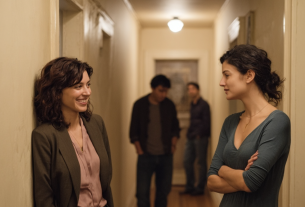“I’ve decided—I’m going to my mother’s on Saturday. For about three months, probably.”
The words fell onto the table between the plate of fried potatoes and the salad. They fell lightly, casually, like bread crumbs. Artyom said them without looking up from his food, carefully spearing a golden piece of chicken with his fork. For him, it was a settled matter, not up for discussion. Just a fact announced over dinner. He didn’t even raise his eyes, sure that, as always, he would hear the usual tired “all right,” or at worst a few ritual sighs in reply.
But there was nothing in response. Only the sound of his own chewing suddenly became deafening. He lifted his head. Kira didn’t move. Her fork lay on the table beside her plate, which she hadn’t touched again. She wasn’t looking at him. Her gaze was directed somewhere at the wall, but it was obvious she didn’t see the faded pattern of the wallpaper or the kitchen clock. She was staring into a kind of void that had just opened right in the middle of their kitchen. Her face was perfectly calm, almost lifeless, and that scared Artyom more than any hysterics.
“Aren’t you going to say anything?” he asked, a note of irritation creeping into his voice. The silence was a challenge. “She needs the fence fixed, the porch roof re-shingled. She can’t handle it on her own.”
He spoke with certainty, listing weighty, manly tasks that, in his opinion, couldn’t be compared to their city life. This was his armor, his indisputable trump card, which he laid on the table for the third time in two years of their marriage. Three months then, two and a half last year, and now another three. In total—almost a year of living apart. A year given to a fence and a roof.
Kira slowly turned her head toward him. She looked at him for a long, studying moment, as if seeing him for the first time. Not as a husband, but as a stranger who had accidentally sat down at her table. There was no hurt or anger in her eyes. Only a cold, detached curiosity.
“Artyom,” she said quietly, but her voice rang clear and weighty in the frozen air. “The kitchen faucet has been leaking for a month. Remember? I told you three times. It drips. Drip-drip. You can hear it especially well at night.”
He blinked, at a loss. The faucet? What did the faucet have to do with anything?
“Well, I would’ve called a plumber if the husband’s hands don’t get around to it,” he muttered, feeling his confidence start to crack.
“I don’t need a plumber, Artyom. I need a husband. Here. In this house. I got married; I didn’t sign up for the sailors’ wives club who wait months for their captains to come back from voyages. Only your voyage is always in the same direction.”
He started to boil over. The conversation wasn’t going according to plan. She dared to contradict him, to compare his sacred filial duty to some dripping faucet.
“You don’t understand! It’s my mother! Who’s going to help her if not me? She has no one but me! She’s a woman; she can’t patch a roof by herself!”
This was his main, final argument. Ironclad. Impregnable. It always worked.
Kira gave a crooked smile, but the smile didn’t reach her eyes.
“You’re right. Your mother needs help. That’s sacred.”
Artyom exhaled in relief. Finally! It sank in! Now she’d sigh and start packing his socks for the road. But Kira went on, and her voice grew even firmer and colder, like ice.
“So here’s what we’ll do. You finish your dinner, pack your things, and go to her. You help with the fence, the roof, the garden—everything that needs doing. And you stay there. Because if you prefer being a son rather than a husband, I won’t stand in your way. Consider yourself a free man. I’ll text you the court address. You can file for divorce when you’re done with the fence.”
For a moment Artyom thought he’d misheard. That it was some lousy, inappropriate joke brought on by a bad mood or a woman’s migraine. He even tried to force out a chuckle, but the sound stuck in his throat, coming out as a hoarse, gurgling spasm. He set his fork down. His appetite vanished, leaving a nasty metallic taste in his mouth.
“Kira, what’s wrong with you? Lost your mind? What divorce? Are you sane? Because I’m going to help my mother?”
He tried to inject condescension into his voice, as if speaking to a wayward child throwing a tantrum over nothing. But Kira’s calm, her still posture, and her direct, unblinking gaze demolished his defensive construction. She wasn’t performing. She wasn’t bluffing.
“I’m perfectly sane, Artyom. Probably for the first time in two years. This isn’t because you’re going. It’s because you stay there. In your mind, in your body—doesn’t matter. You’re not here. You’re not with me. Your life is there, on your mother’s plot of land, with her fence and her roof. And here you just spend the night between your filial exploits.”
He leapt from his chair. The small kitchen instantly felt cramped, filled with his indignation. He began pacing from the fridge to the window, flinging his arms as if to swat away her words like pesky flies.
“What are you even talking about? What other life? I slog at two jobs so we can live decently! To keep this apartment going! I’m not going to a bar with buddies, not to a resort! I’m going to work! To help the only close person who raised me! And you! You sit here warm and cozy and dare reproach me! You just can’t understand what duty is!”
He dumped everything on her that he’d been saving for occasions like this: his exhaustion, his work, his sacred duty. This was his shield, his tried-and-true weapon that had always made her fall silent and feel guilty. But today it misfired.
Kira didn’t even stir. She kept sitting at the table, and her stillness spoke louder than all his pacing.
“I understand everything, Artyom. I understand that your mother is your mother. I’m not asking you to choose. You made your choice long ago; you just didn’t dare admit it to yourself. And I’m tired of pretending I don’t notice. Tired of being second place after roofing felt and fence boards.”
“What nonsense are you spouting, Kir? Maybe quit—”
“If you’re planning to go to your mother’s for three months, maybe we should just get divorced altogether? Because I’m sick of you spending most of your time at her place!”
His face twisted. He stopped and stared at her, and in his look there was not just anger, but genuine, childlike bewilderment. He truly didn’t understand. In his worldview he was a hero, a knight torn between duty and home. And she, the ungrateful one, didn’t appreciate it. He realized his arguments weren’t working. He’d hit a dead end, and in that dead end, as always, there was only one exit, one saving call.
He spun around, snatched his phone from the windowsill, and, turning away theatrically, dialed a number. He spoke softly, but in the taut silence of the kitchen every word sounded as if he were shouting through a megaphone.
“Hi, Mom. Yeah, everything’s fine… almost. Listen, here’s the thing… Kira’s throwing a fit. Yeah, because of the trip. Can you believe it? Says if I go, we’re getting divorced… No, I’m not kidding, she’s dead serious… Says I’m choosing you over her… I don’t know what’s gotten into her! Out of nowhere! Yeah… Yeah, of course. I think so too. Okay, Mom. I’ll wait.”
He hung up and set the phone on the table as if placing a chess piece down to declare checkmate. He looked at Kira again. The bewilderment was gone from his eyes. Now there was a cold, borrowed confidence. He was no longer alone in this battle. He’d called in reinforcements. Heavy artillery.
They didn’t wait long. Twenty minutes, maybe half an hour. The time wasn’t filled with ringing silence or awkward quiet. Having caught a second wind, Artyom ostentatiously poured himself tea, set the kettle on the stove with a clatter, and sat back in his seat, making it clear that life goes on and that petty female whims are just an annoying hiccup. He no longer looked at Kira. He looked at his phone, where some diagrams filled the screen, as if he were already planning the repair of his mother’s roof. He was in his element, in a world of men’s tasks and clear objectives where her petty complaints had no access.
Kira didn’t move the entire time. She didn’t touch the now-cold dinner, didn’t get up to clear the table. She just sat there, straight as a string, becoming a silent part of the interior. Her calm was no longer passive. It had turned active, offensive. It was the calm of a person who has made a decision and is now merely watching the fuss of those who still try to change the inevitable.
The doorbell rang—short and commanding. Not a question, a statement. Artyom sprang up as if on cue and hurried to open it. Valentina Pavlovna stood on the threshold. She didn’t look like a frail old woman in need of help. Tall, stately, lips pressed tight, with a sharp, appraising look, she entered the apartment not like a guest, but like an inspector arriving for an audit. She silently took off her good coat, hung it on a hook, and, without so much as glancing at Kira, headed for the kitchen. Her bag—a large, leather, doctor’s-satchel sort of thing—thumped onto a stool. Territory marked.
“Well, tell me, son, what’s happened here? I was just visiting Yelena Petrovna, thought we’d go home together tomorrow, and then this…” she said, addressing Artyom exclusively, as if Kira were invisible.
Receiving the long-awaited support, Artyom started talking. He laid out his version of events, in which he was the victim and Kira the selfish, ungrateful woman who didn’t understand simple human things. He spoke of duty, of helping, of how a mother is sacred.
Valentina Pavlovna listened, nodding slowly. Then she turned to Kira. Her look was cold, like a surgeon’s before an operation.
“I’ve always told Artyom that a family must be built on respect, Kira. Respect for parents, for one’s responsibilities. A man is defined not by how he sits on a couch, but by how he takes care of his loved ones. All of them. And a wife should be his support, not a millstone around his neck.”
Kira remained silent. She looked at the two of them—at the son seeking approval in his mother’s eyes, and at the mother ready to defend her child from the whole world, including from his own wife. They were one whole, a monolith, from which she, Kira, was nothing but a stray, broken-off piece.
“Mom, I explained everything to her!” Artyom chimed in, feeling absolutely right. “That this isn’t a whim, it’s necessary! The faucet can wait; a leaky roof can’t! But she won’t listen!”
“That’s how it always is when someone thinks only of herself,” Valentina Pavlovna sighed sympathetically, looking at Kira again. “When one’s own comfort matters above all. Your husband isn’t going to relax; he’s going to work for your welfare too, for your future. And you put sticks in his wheels.”
The pressure built. They spoke in turns, complementing each other, weaving a tight ring of accusations. They didn’t shout. They spoke calmly, with righteous condemnation in their voices, which was far worse than any shouting. They tried to grind her into the dirt, to make her feel small, guilty, wrong. And at that moment Kira raised her eyes. She didn’t look at her mother-in-law. She looked straight at Artyom, at her husband, who was now standing beside another woman and, in unison with her, was destroying their family.
“I already said it: you leave—we divorce. What part of that isn’t clear?”
She didn’t say it as a question or a threat. It sounded like a statement of fact. A final diagnosis that is no longer up for discussion.
Valentina Pavlovna’s face turned to stone. Her lips thinned into a narrow, angry line.
“So that’s how it is…” she hissed. “Ultimatums, is it. You decided to set conditions for my son?”
“You hear that, Mom?” Artyom exclaimed with a bitter smirk. “That’s her gratitude for everything I do for her! She just wants to get rid of me and of my obligations to you!”
“So that’s your decision, huh?” Artyom stepped toward her, his face flushed with a mix of hurt and righteous anger. “The moment something isn’t your way—it’s divorce? Think you’ve scared me?”
Valentina Pavlovna backed him up, stepping forward to stand shoulder to shoulder with him. Their united front became almost physically palpable. “His father and I lived forty years together—anything can happen. But for a woman to tell a man whether he can visit his mother or not… that disgrace never happened. He’s not going to strangers; he’s going to his own home, the very home you took him from!”
They waited for an answer. For arguments, excuses, shouting. They were ready for a long siege, for a night of lectures and accusations after which the broken Kira, as before, would give in and go pack his suitcase. They were sure of their strength, their rightness, of the inviolability of their “mother and son” alliance.
But Kira didn’t answer. She didn’t get into a squabble. Instead, she rose slowly from the table without a single wasted movement. There was no anger or despair on her face. Only a kind of empty, burned-out concentration. Silently, she walked around them standing in the middle of the kitchen and went into the hall.
“See, Mom? She ran away!” Artyom whispered triumphantly. “Nothing to say!”
Valentina Pavlovna merely snorted with contempt, certain the opponent had retreated to the bedroom—to cry and feel sorry for herself.
A minute later Kira returned. In her hands she carried Artyom’s large travel bag. Not the one he used for rare business trips, but the old, scuffed, timeworn one—the very one he always took on his long stays at his mother’s. She set it on the kitchen floor without a word and unzipped it. The loud, dry sound made Artyom and his mother fall silent.
Kira left again and came back holding a stack of clothes. She didn’t rummage through the closet or dump drawers. She took exactly what lay on a separate shelf, neatly set aside by her for “mom’s needs.” She tossed in his old work pants with the faded knees, the thick wool sweater he wore only there, a couple of washed-out T-shirts. She did it methodically, without fuss, like a nurse preparing instruments for surgery. Her movements were precise and deliberate.
“What are you doing?” Artyom’s voice trembled, all his confidence gone.
Kira didn’t answer. She went to the entryway and returned with his heavy hiking boots, still bearing traces of last year’s mud. She dropped them into the bag on top of the sweater. Each of her gestures was a blow that hurt far more than any words. She wasn’t throwing his things out. She was outfitting him for a journey. For the very journey from which, for her, he would not return.
“Stop this circus!” Valentina Pavlovna cried, realizing the situation was slipping out of control. “Kira, I’m telling you—stop immediately!”
But Kira seemed deaf. She zipped the bag. Then she walked to the key rack by the kitchen door. Two sets of keys hung from the hook. Hers and his. She took his. The metallic jingle in the ensuing silence sounded like a sentence. Artyom stared at his keys in her hand, and finally it began to dawn on him. This wasn’t a bluff. It wasn’t a performance. It was an execution.
She went to the bag, calmly unzipped the side pocket, pulled out the spare set of house keys, and zipped it up again. That was that. The final stroke.
Hoisting the heavy bag without bending, she carried it to the front door. She turned the lock, flung the door open, and set the bag out on the landing. Then she turned back. She looked not at her husband, but at the two of them standing together—bewildered, all their swagger gone, stunned by this cold, ruthless methodicalness. Her gaze was calm.
“Well then, now you’re ready,” she said in a flat, emotionless voice. “You can go. Your mother is waiting.”
And she closed the door. She didn’t slam it, didn’t throw every bolt. She simply pulled it shut, cutting them off from her life. The click of the lock was quiet, almost routine. But for Artyom and Valentina Pavlovna, left standing in the half-dark of the stairwell beside the orphaned travel bag, it sounded louder than any explosion. They had won. He was free to go to his mother. Only he no longer had a home.



